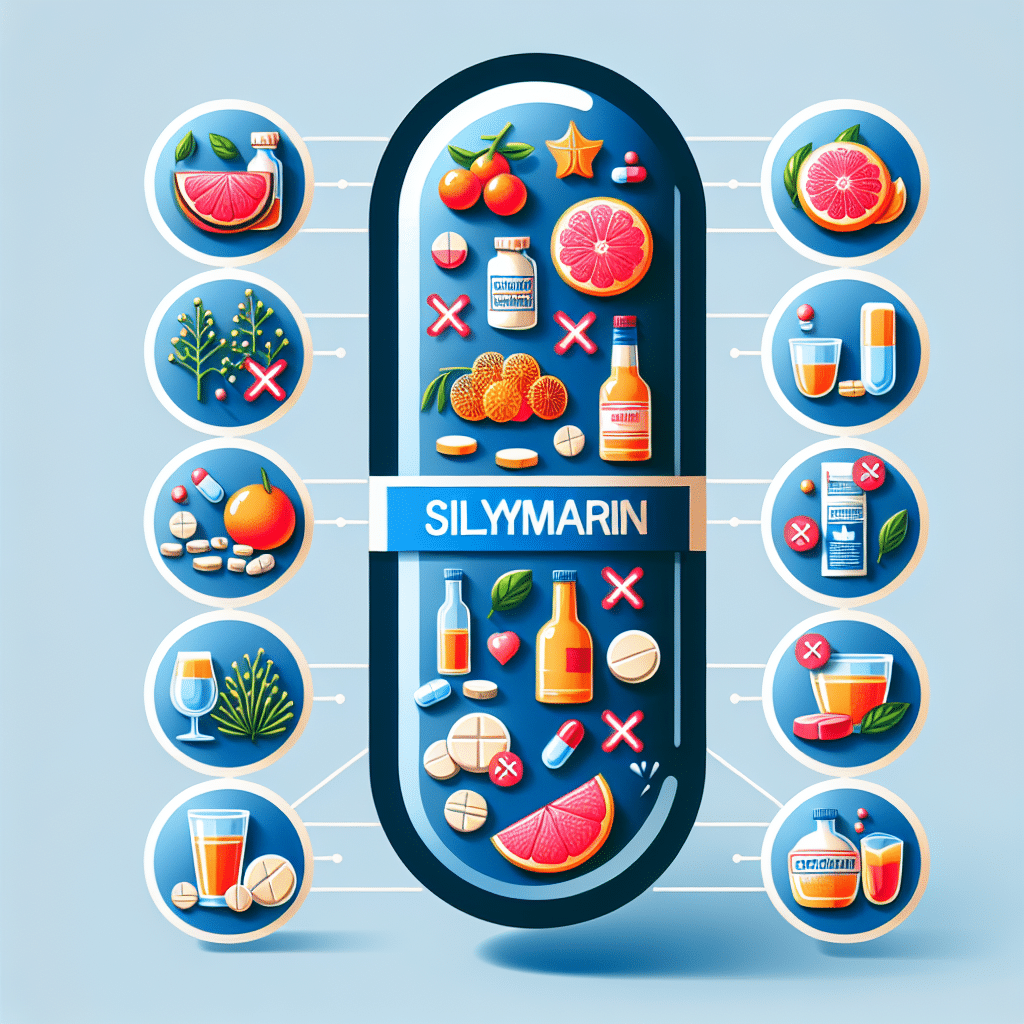Silymarin Interactions: What to Avoid
-
Table of Contents
- Silymarin Interactions: Essential Precautions and Combinations to Avoid
- Understanding Silymarin and Its Uses
- Key Interactions to Consider When Using Silymarin
- Case Studies and Research on Silymarin Interactions
- Recommendations for Safe Silymarin Use
- Conclusion: Navigating Silymarin Interactions for Optimal Health
- Discover ETchem’s Premium Protein Products
Silymarin Interactions: Essential Precautions and Combinations to Avoid

Silymarin, a natural compound extracted from the seeds of the milk thistle plant (Silybum marianum), has been widely recognized for its potential liver-protective properties. It is commonly used as a dietary supplement for its antioxidant, anti-inflammatory, and antifibrotic effects. However, like any bioactive substance, silymarin can interact with various medications and substances, which may alter its effectiveness or lead to adverse effects. Understanding these interactions is crucial for anyone considering or currently using silymarin supplements.
Understanding Silymarin and Its Uses
Silymarin is a flavonolignan complex that includes silibinin, silychristin, and silydianin, with silibinin being the most active component. It is primarily used to support liver health, potentially aiding in the treatment of liver diseases such as cirrhosis, jaundice, hepatitis, and gallbladder disorders. Silymarin is also being studied for its possible benefits in cancer therapy, diabetes management, and neuroprotection.
Key Interactions to Consider When Using Silymarin
When taking silymarin, it is important to be aware of its interactions with other substances. Here are some key combinations to avoid or use with caution:
- Prescription Medications: Silymarin may interfere with the metabolism of certain drugs, leading to altered blood levels and efficacy. It is particularly important to monitor its use with drugs that are substrates of the cytochrome P450 enzyme system.
- Diabetes Medications: Since silymarin can lower blood sugar levels, it may enhance the effects of diabetes medications, potentially leading to hypoglycemia.
- Chemotherapy Drugs: Silymarin may affect the way certain chemotherapy drugs work, either by enhancing their therapeutic effects or by reducing their efficacy.
- Antiplatelet and Anticoagulant Drugs: Silymarin may have a blood-thinning effect, which could increase the risk of bleeding when taken with similar medications.
- Hormone-related Medications: Due to its possible estrogenic effects, silymarin might interact with hormone therapies, including birth control pills and hormone replacement therapy.
Case Studies and Research on Silymarin Interactions
Several studies have highlighted the importance of monitoring silymarin interactions. For instance, research has shown that silymarin can inhibit certain enzymes responsible for drug metabolism, potentially leading to higher levels of drugs in the body. In contrast, other studies suggest that silymarin may induce some of these enzymes, possibly resulting in decreased drug effectiveness.
One case study involving a patient on the anticoagulant warfarin reported increased bleeding tendencies after the patient started taking a silymarin supplement. This underscores the need for caution and consultation with healthcare providers when combining silymarin with other medications.
Recommendations for Safe Silymarin Use
To minimize the risk of interactions, consider the following recommendations:
- Consult with a healthcare professional before starting silymarin, especially if you are taking prescription medications.
- Regularly monitor blood levels of medications that may interact with silymarin.
- Be cautious of using silymarin if you have hormone-sensitive conditions, as it may mimic estrogen.
- Adjust the dosage of other medications if necessary, under the guidance of a healthcare provider.
Conclusion: Navigating Silymarin Interactions for Optimal Health
In conclusion, while silymarin offers promising health benefits, particularly for liver health, it is essential to be aware of its potential interactions with other substances. By avoiding certain combinations and consulting with healthcare professionals, individuals can safely incorporate silymarin into their wellness regimen. As with any supplement, personalized advice and careful monitoring are key to ensuring safety and efficacy.
Discover ETchem’s Premium Protein Products
If you’re looking for high-quality protein supplements to complement your health and wellness journey, consider exploring ETchem’s range of protein products. With a focus on purity and effectiveness, ETchem offers a variety of collagen-based supplements that can support your nutritional needs.
About ETChem:
ETChem, a reputable Chinese Collagen factory manufacturer and supplier, is renowned for producing, stocking, exporting, and delivering the highest quality collagens. They include marine collagen, fish collagen, bovine collagen, chicken collagen, type I collagen, type II collagen and type III collagen etc. Their offerings, characterized by a neutral taste, instant solubility attributes, cater to a diverse range of industries. They serve nutraceutical, pharmaceutical, cosmeceutical, veterinary, as well as food and beverage finished product distributors, traders, and manufacturers across Europe, USA, Canada, Australia, Thailand, Japan, Korea, Brazil, and Chile, among others.
ETChem specialization includes exporting and delivering tailor-made collagen powder and finished collagen nutritional supplements. Their extensive product range covers sectors like Food and Beverage, Sports Nutrition, Weight Management, Dietary Supplements, Health and Wellness Products, ensuring comprehensive solutions to meet all your protein needs.
As a trusted company by leading global food and beverage brands and Fortune 500 companies, ETChem reinforces China’s reputation in the global arena. For more information or to sample their products, please contact them and email karen(at)et-chem.com today.




